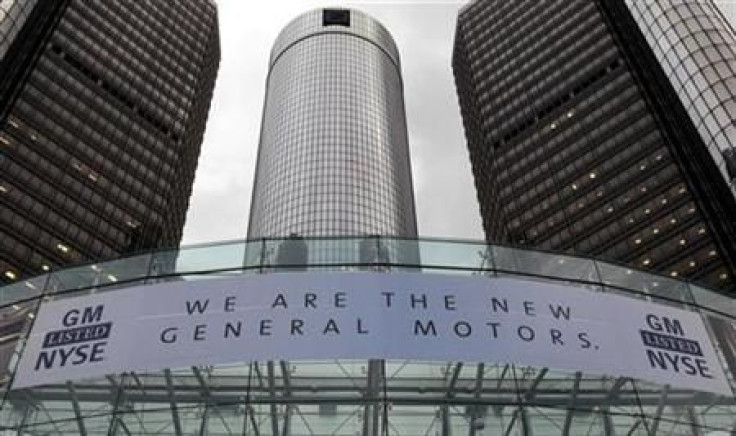January US Auto Sales To Jump As Top Automakers Expect Better Year Ahead

The top automakers expect a robust 2013. That's the upshot from analysts who expect double-digit sales increases over last year following the best December since the 2008-09 recession.
Detroit is cranking out cars so fast that U.S. retail auto sales in January may be the highest in five years, jumping more than 18 percent. Retail car sales exclude fleet purchases, such as those made by rental agencies, and are considered a more accurate representation of consumer sentiment.
TrueCar.com, an auto analyst research firm, predicts retail sales for January to reach 877,533, while J.D. Power & Associates expects them to come in at 812,600 vehicles, representing a seasonally adjusted annualized rate of 12.9 million units. That would compare to last January's 10.9 million vehicles.
Both figures suggest a continued rebound in the auto sector since the collapse during the subprime mortgage crisis of 2008-09. This year, most estimates suggest total car and truck sales (fleet and retail) to range between 15 million and 15.5 million units, still short of the pre-recession numbers of 17 million units a year, but well above the 10.9 million sold in 2009. Last year, 14.4 million vehicles were delivered to consumers and fleet buyers.
“Automakers are kicking off the year strong, staying true to disciplined incentive spending as many curtailed their spending in January as the current lineup of products speak for themselves,” said Kristen Andersson, analyst for TrueCar.com, which expects industrywide incentive spending to decline 8.3 percent this year. Lower incentive spending is an indication that automakers feel confident enough to reduce margin-battering sales specials that they relied on in recent years in order to lure wary buyers.
Germany’s Volkswagen AG (FRA:VOW) is expected continue its strong U.S. performance with the largest increase for January, 26.5 percent, compared to last year, on a relatively small volume of a little more than 46,245 vehicles, according TrueCar.
Japanese auto giants Honda Motor Co Ltd (TYO:7267) and Toyota Motor Corporation (TYO:7203) are both seen reporting sales growth around 20 percent on combined volume of nearly 250,000 units sold in the U.S.
The Big Three automakers are expected to have sold 472,432 units this month, led by Detroit’s General Motors Co. (NYSE:GM), maker of the Buick, Cadillac, Chevrolet and GMC brands, with 190,702 passenger car and light trucks. However, GM’s sales growth compared to the previous January is forecast to be the lowest of the U.S. companies at 13.5 percent.
Ford Motor Co. (NYSE:F) of Dearborn, Mich., which owns the recently rebranded Lincoln Motors, and Chrysler Group LLC, a subsidiary of Fiat S.p.A. (PINK:FIATY) of Italy, are both expected to see sales grow by about 18 percent from last year.
This month’s sales performance will decline across the board from a record December where total (retail and fleet) car and light truck sales registered 1.35 million units, according to Motor Intelligence. Including fleet sales, dealers are expected to sell 1.05 million units this month.
U.S. auto sales figures are closely watched because they offer the first indicator of the month regarding the state of the economy ahead of other monthly economic weathervanes, such as retail sales, consumer confidence and durable goods purchasing.
The optimism han't done much for automaker stocks this month, however.
Shares of GM closed Tuesday at $28.45, down 38 cents, about even for the month but up nearly 17 percent over the past 52 weeks.
Shares of Ford closed at $13.14, down 64 cents. They've gained 1.5 percent in January. With dividends, they've gained 10 percent for the past 52 weeks.
© Copyright IBTimes 2024. All rights reserved.












